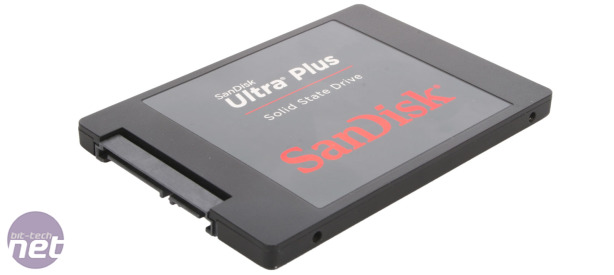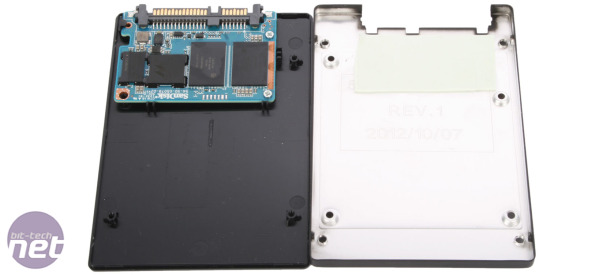Performance Analysis
In AS SSD, the Ultra Plus achieves a sequential read speed of 464MB/sec. It's certainly not a slow speed, but compared to modern drives it's significantly lower than what we were hoping given the claimed 530MB/sec maximum. Samsung's SSD 840 256GB is 12 per cent faster in the same test, and even the older 830 series outperforms the Ultra Plus here. That said, the SanDisk SSD turns the tables on the SSD 840 in the same benchmark's sequential write test, with a respectable 418MB/sec. Only costlier drives outperform it here, and it's a whopping 67 per cent faster than Samsung's value-oriented drive. This serves to highlight the considerable performance difference between TLC and MLC NAND.4K random read and write performance at the single queue-depth level in AS SSD is excellent with the Ultra Plus. Its read speed of 30.67MB/sec is second only to the much more expensive SSD 840 Pro, but considerably ahead of other drives, and its write speed of 92.24MB/sec is the fastest we've observed, which suggests that the nCache functionality really is effective for small file writes. In the 64 QD test, the drive falls lower in the charts, especially in the write test. Though such a scenario is unrealistic for the average home user, it does highlight the limitations of the four channel controller.
CrystalDiskMark produces similar sequential results to AS SSD, with the Ultra Plus achieving a disappointing sequential read speed of 450MB/sec, 16 per cent behind the SSD 840, and a more substantial sequential write speed of 390MB/sec, 52 per cent ahead of the Samsung drive. The single queue-depth 4K random read benchmark produces a result of 29.15MB/sec, which this time places the Ultra Plus on par with the SSD 840. However, write speeds are again much more impressive, presumably thanks to nCache, with its 101.2 MB/sec being second only to the OCZ Vertex 4, and significantly higher than the SSD 840's 74MB/sec. We again see a marked performance dip in the higher QD 4K tests though, which leave the Samsung SSD 840 comfortably ahead by 35 and 60 per cent in read and write speeds respectively.
In PCMark 7, the Ultra Plus is left trailing the Samsung SSD 840 by around 10MB/sec in the Starting Applications test. In the same benchmark, the Gaming test produces a result of 15.55MB/sec, which is sadly the lowest on record, although the differences between drives in this test are relatively small. With an average Windows 7 boot time of 9.76 seconds recorded with BootRacer, the Ultra Plus emerges favourably here, bested only by a pair of OCZ drives. The SSD 840 250GB is actually the slowest drive in this test, but still manages 10.67 seconds.
TRIM
As part of our testing methodology for SSDs, we test them fresh out of the box, and then fill the drive completely, before deleting the contents and running the TRIM command which cleans up NAND and should avoid read/modify/write based performance dips. After a ten minute wait for the drive to execute the TRIM command and/or any of its own garbage collection processes, we then re-test each drive to assess it's ability to maintain performance over time.After the drive had been filled and given time for the TRIM command to execute, our synthetic benchmarks revealed minor performance degradation in sequential write speeds, although to a lesser extent than we saw with both the SSD 840 Pro and Corsair Neutron GTX. Both AS SSD and CrystalDiskMark revealed a 10MB/sec or so drop in this area, although it was still way ahead of the SSD 840.
Conclusion
It's a tough call between the Ultra Plus and its main competitor, the Samsung SSD 840. With its MLC NAND, the SanDisk drive has a clear lead in sequential write performance, but in sequential read the Samsung SSD has a distinct advantage. Random performance with small files favours the Ultra Plus and its nCache, but at higher queue-depths the Samsung regains a healthy lead thanks to its eight channel controller. Booting Windows 7 is a touch snappier with the SanDisk drive, whereas the SSD 840 benefits from faster performance in gaming and application launching workloads.As both drives have the same warranty, what it ultimately comes down to, therefore, is price and value for money. In terms of formatted capacity, the Ultra Plus 256GB at £138 will cost £0.58/GB, but the Samsung SSD 840 250GB is now available for £130, or £0.56/GB. Though there are advantages to both, we'd say the Samsung drive is the one to go for right now, especially in the US where it's $30 cheaper. This could easily change based on a user's specific needs or price fluctuations, however, so suffice it to say that either drive would be a fine choice for those looking for the best value method of upgrading to an SSD.

-
Value31 / 35
-
Features14 / 15
-
Performance40 / 50


MSI MPG Velox 100R Chassis Review
October 14 2021 | 15:04











Want to comment? Please log in.